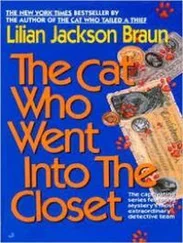"That was last year, Lovey," her mother corrected her. "Now you're three in April."
"I'll tell you one thing," Qwilleran said, "you'd better change her name, or she'll never get past the New Hampshire primary. The media will have a picnic with a name like Lovey." Then he asked Lori if she had a place to store the slipcovers from Four Pips, as he seemed to be allergic to the dye. "I tried stripping the rooms last night," he said, "and haven't had any bronchitis or asthma today."
"I never knew you had allergies, Qwill! That's too bad! The housekeeper will get them out of your way as soon as possible."
"They're all in the bedroom closet," he said. "Tell her not to let the cats out."
At the bike rack downtown Qwilleran rented an all-terrain bicycle for his first island adventure, a trip to Lighthouse Point. West Beach Road was uphill all the way. As he passed the Domino Inn, guests waved to him from the porch, and Mitchell chased him like a friendly, barking dog. Next came three other B-and-Bs, Harriet's Family Cafe, and a unique service operation called Vacation Helpers. According to the sign in front of the converted lodge, they would "sit with the baby, wash your shirt, bake a birthday cake, sew a button on, cater a picnic, address your postcards, mail your fudge, clean your fish."
Qwilleran stopped to read it and thought it a good idea. The upper floors were apparently dormitories for hotel employees, because a group of them were leaving for work, wearing the skull-and-crossbones. One of them waved to himthe waitress from the night before.
At that point the commercial aspect of the beach road ended, and a forbidding sense of privacy began. First there was the exclusive Grand Island Club with tennis courts, a long row of stables, and a private marina, docking small yachts and tall-masted sailboats. Beyond were the summer estates, with large, rustic lodges set well back behind broad lawns. On the other side of the road, flights of wooden steps led down to private beaches with white sand. There were no bathers; the lake was notoriously cold, even in summer, and the lodge owners would undoubtedly have heated swimming pools.
Driveways were marked with discreet, rustic signs identifying the estates as RED OAKS or WHITE SANDS or CEDAR GABLES. The last and largest was THE PINES, protected by a high iron fence similar to that in front of Buckingham Palace.
How, Qwilleran wondered, were these elite vacationers reacting to the increased traffic on the beach road? On weekends there would be a continual parade of cyclists pedaling to the lighthouse. Carriageloads of gawking sightseers would stop in front of the grandest lodges to take pictures and listen to the guides spieling about family scandals.
By the same token, how would the reclusive islanders react to the noisy strangers, the aroma of fudge polluting their lake-washed air, and brash cityfolk wearing clown colors and trespassing on their sacred privacy? Would these rugged natives resent the intrusion strongly enough to retaliate? They might be an underground army of little Davids aiming slingshots at a well-capitalized Goliath who was getting a tax break.
After The Pines, the lush woods dwindled to stunted, windswept vegetation atop a mountain of sand. Beyond could be seen the lighthouse, a pristine white against a blue sky. For the last few hundred yards the road was steep, but Qwilleran bore down on the pedals resolutely. He was breathing hard when he reached the summit, but he was in better shape than he had realized.
Lighthouse Point was a desolate promontory overlooking an endless expanse of water to the north, east, and west. The tower itself was dazzlingly white in the strong sunlight, and adjacent buildings were equally well maintained. There was no sign of life, however. Such romantic figures as the lighthousekeeper and the lighthouse-keeper's daughter had been made obsolete by automation. A high, steel fence surrounded the complex. Inside the fence, but visible to visitors, a bronze plaque was a reminder of the old days:
IN MEMORY OF THREE LOYAL LIGHTKEEPERS
WHO SAVED HUNDREDS OF LIVES BY
KEEPING THE BEACON BURNING BUT
LOST THEIR OWN IN THE LINE OF DUTY
There followed the names of the three mentypical north-country names that could be found in the old cemeteries of Moose County: Trevelyan . ., Schmidt . . . Mayfus. Yet, for some reason they were considered heroes. Qwilleran asked himself: What did they do to earn this recognition? Were there three isolated incidents over a period of years? Or were they swept off the rock in a storm? Why is none of this in the county history? He made a mental note to discuss the oversight with Homer Tibbitt.
On the public side of the fence the ground was a plateau of stones and weeds that showed evidence of unauthorized picnicking. There were no picnic tables or rubbish containers provided. Empty bottles were scattered about the site of a campfire, and food wrappers had blown against the fence and over the edge of the cliff. Down below were the treacherous rocks, where old wooden sailing ships had been dashed to pieces in the days before the lighthouse was built.
Moose County, in its nineteenth-century boom years, had been the richest in the state. Every month hundreds of vessels passed the island, transporting lumber, ore, gold coins, and rum, according to Mr. Tibbitt. Hundreds of wrecks now lay submerged and half buried in sand under those deep waters.
Today the lake could only gurgle and splash among the boulders, but the wind was chill on top of the cliff, and Qwilleran soon coasted back down the hill. He gripped the handlebars and clenched his jaw in concentration as :he bike loped recklessly over rocks and ruts. Two young athletes in helmets and stretch pants were pedaling their thirty-speed bikes easily up the slope that had caused him so much effort. They even had breath enough to shout "Hi, neighbor! Nice goin" " as they passed.
After returning his own bike to the rental rack, he bought a supply of snacks and beverages at the delifor himself and possible visitors. There were two large shopping bags, and he hailed a horse cab to carry them home. Without even greeting the Siamese, he checked the bedroom closet. The slipcovers had been removed, as Lori had promised, but the same odor rushed out to meet his offended nose; it had permeated his clothing.
"That woman!" Qwilleran bellowed. "May her piano always be out of tune!" Without a word to the bewildered cats, he stuffed his belongings into the two shopping bags and hiked up the beach road to Vacation Helpers.
The enterprise occupied the main floor of the former fishing lodge. In one large, open space there were work tables and such equipment as washer, dryer, ironing board, sewing machine, word processor, and child's playpen.
When Qwilleran dumped the5 contents of his shopping bags on one of the tables, the young woman in charge sniffed and said, "Mmm! Someone lovely has been hanging around you!"
"That's what you think," he said grouchily. "How fast can you do this stuff? I need some of it to wear to dinner."
"One shirt is silk, and it'll need special care, but most of it's wash-and-wear. I can have everything ready by ... six o'clock?"
"Make it five-thirty. I'll pick it up." Without any of his usual pleasantries he started for the door.
"Sir! Shall I give your bundle to anyone with a big moustache?" she asked playfully. "Or do you want to leave your name?"
Читать дальше












